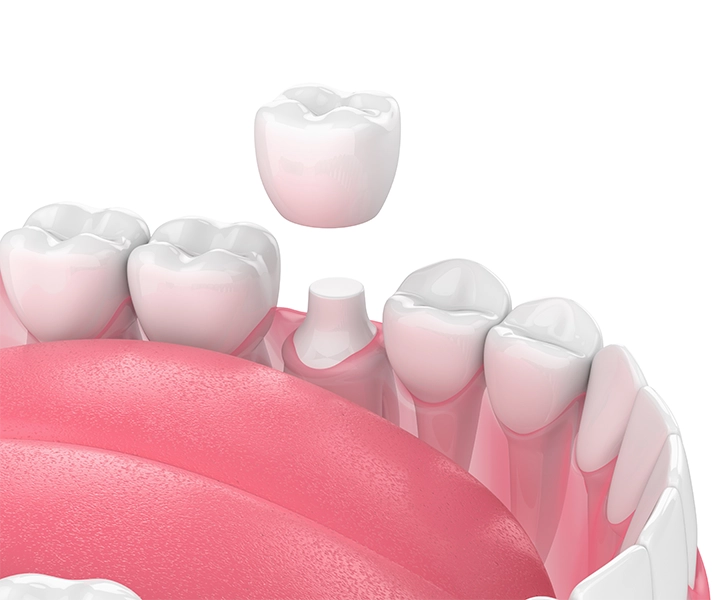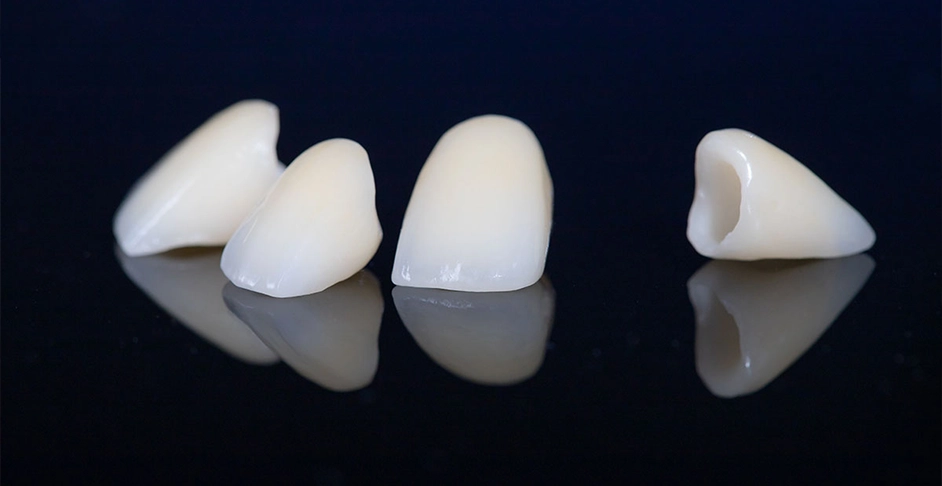Imagine being able to smile confidently again, knowing your teeth are strong and look as good as natural ones. Dental crowns make this possible by offering a seamless solution to severely decayed, damaged, cracked, or worn teeth. Whether you’re dealing with caries, injury, or wear and tear, a dental crown can restore your tooth’s strength, function, and natural appearance.
Are you curious about how they work and whether they’re right for you? In this guide, we’ll dive into the ins and outs of dental crowns, exploring the different types, their benefits, the step-by-step procedure, and post-treatment care for long-lasting results. Keep reading to discover how dental crowns can transform your smile!
What is a dental crown?
A dental crown is a custom-made cap that completely covers a damaged or weakened tooth, restoring its original shape, size, strength, and appearance. They are designed to fit snugly over the entire visible portion of the tooth above the gum line, offering a protective shield.
Crowns are typically recommended when decay, cracks, or wear have extensively damaged a tooth and cannot be fixed with a simple filling. Crowns help maintain the tooth’s functionality while enhancing its natural look, ensuring that your smile remains strong and beautiful.

Types of dental crowns
Dental crowns come in a variety of materials, each offering unique benefits based on the specific needs of the patient. Here’s an overview of the most popular options:
Porcelain crowns: Porcelain crowns are favoured for their ability to closely resemble natural teeth. Their translucent quality makes them an excellent choice for restoring front teeth, where aesthetics are a main priority. These crowns can be colour-matched to blend seamlessly with your surrounding teeth, offering a natural, flawless look.
Zirconia crowns: Zirconia is a strong and durable material that is rapidly gaining popularity in restorative dentistry. These crowns offer a perfect balance of strength and beauty, making them an excellent option for front and back teeth. Zirconia crowns are highly resistant to wear and fractures, ensuring long-term durability.

Composite resin crowns: Composite resin crowns are a more affordable option, commonly used for temporary restorations or when a tooth isn’t under heavy pressure. While they aren’t as durable as porcelain or metal crowns, they provide a practical, cost-effective solution for short-term use.
Metal crowns: Metal crowns, typically made from durable alloys such as gold or platinum, are renowned for their strength and longevity. They are highly resistant to wear and require less tooth structure removal, making them ideal for back teeth, where durability is more important than appearance.
Metal crowns: Metal crowns, typically made from durable alloys such as gold or platinum, are renowned for their strength and longevity. They are highly resistant to wear and require less tooth structure removal, making them ideal for back teeth, where durability is more important than appearance.
However, due to aesthetic concerns and growing awareness of potential health issues, metal crowns have become less popular in recent years. Many patients now prefer more natural-looking options like porcelain or zirconia crowns, especially for visible teeth.
Porcelain-fused-to-metal crowns: These crowns combine the best of both worlds: the strength of a metal base and the aesthetic appeal of porcelain. The metal foundation ensures durability, while the porcelain outer layer can be colour-matched to surrounding teeth. Porcelain-fused-to-metal crowns are versatile and are often used for both front and back teeth, offering a good balance of strength and beauty.
Each type of crown is tailored to meet specific needs, from cosmetic preferences to long-lasting functionality. Your dentist will help determine the best option based on your unique dental situation.
When Are Dental Crowns Needed?
Dental crowns are often recommended in the following situations to restore the function and appearance of your teeth:
Large fillings: When a filling becomes too large to effectively restore a tooth, a crown can provide the necessary support and prevent the tooth from breaking down further.
Root canal treatment: After a root canal procedure, a crown is often placed to rebuild the tooth and protect it from future damage or decay. This helps preserve the tooth’s integrity and functionality.
Dental implants: When a tooth is replaced with a dental implant, a crown is attached to the implant post to restore the look and function of a missing tooth, giving you a full and healthy smile again.
Cracked or broken teeth: Teeth that have cracked or broken due to injury, trauma, or wear-and-tear may require a crown to stabilise and protect the tooth, preventing additional damage and restoring its strength.
Cosmetic enhancement: Crowns can also be used to improve the appearance of teeth that are severely decayed, discoloured, misshapen, or worn down, providing a natural, aesthetically pleasing result.
Comprehensive dental crown procedure
The process of getting a dental crown typically involves two visits to your dentist, ensuring that your restoration fits comfortably and functions properly:

First visit – tooth preparation:
During the initial appointment, your dentist will thoroughly examine the affected tooth and take X-rays or CBCT scans to assess its structure. If there is any decay, it will be removed, and the remaining tooth will be reshaped to create a secure base for the crown. Once the tooth is prepared, your dentist will take a detailed impression, which will be sent to a dental lab for the creation of your custom crown. A temporary crown may be placed to protect the tooth until your permanent crown is ready.
Second visit – crown placement:
At the follow-up appointment, your dentist will carefully place the custom crown over the prepared tooth to check for proper fit, alignment, and comfort. Adjustments will be made to ensure the crown aligns with your bite and feels natural. Once everything is perfect, the crown will be permanently bonded to your tooth, completing the procedure and restoring the function and appearance of your smile.
Benefits of dental crowns
-
Restores function: Crowns fully restore the function of damaged teeth, enabling you to bite, chew, and speak without discomfort, just as you would with a healthy tooth.
- Durable and long-lasting: With proper care, dental crowns are highly durable and can last many years, providing reliable, long-term protection for your teeth.
- Aesthetic appeal: Crowns made from materials like porcelain and zirconia are designed to blend seamlessly with your natural teeth, enhancing the appearance of your smile while maintaining a natural look.
- Protects weak teeth: Crowns act as a protective shield for weak or damaged teeth, helping prevent further decay or damage and reducing the need for more invasive treatments like extractions.
- Prevents further damage: For teeth that have undergone procedures such as root canals or fillings, crowns offer an extra layer of protection, preventing further deterioration and ensuring the tooth remains strong and functional.
Caring for your dental crown
Although dental crowns are designed for durability, proper care is essential to ensure they last as long as possible:
Good oral hygiene: Maintain a regular brushing and flossing routine to keep your crown and the surrounding gums healthy. Proper oral hygiene helps prevent decay and gum disease, which can affect the crown’s longevity.
Avoid hard or sticky foods: While crowns are strong, certain foods—such as ice, hard candies, or sticky treats—can cause damage to your crown. It’s important to avoid biting down on very hard items to protect the integrity of your restoration.
Regular dental checkups: Regular visits to your dentist are crucial for monitoring the condition of your crown. During these checkups, your dentist can ensure that the crown is secure, properly aligned, and free of any damage, addressing any issues before they become more serious.

The key to restoring strength, function, and beauty to your smile
Dental crowns are an excellent, reliable solution for repairing and protecting damaged or weakened teeth. Whether you’re looking to restore function or enhance the appearance of your smile, crowns offer a versatile option that combines both strength and aesthetics.
If you’re considering a dental crown, it’s important to consult with your dentist to determine if it’s the right treatment for you. Explore our other resources for more information on dental care and restorative treatments to help you make informed decisions about your smile’s health.

Dr. Huy Tran is a dedicated dentist who prioritises patient comfort and understanding. He takes the time to listen to each patient’s unique concerns and develops personalised treatment plans. Dr. Huy believes in clear communication and ensures patients fully understand their treatment options before making any decisions. He is committed to helping patients achieve and maintain optimal oral health throughout their lives and enjoys connecting with patients of all ages and backgrounds.
Learn more about Dr. Huy and his practice: Complete Dental Works





